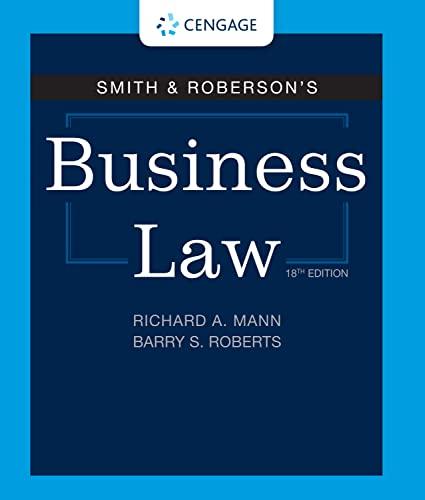Question
Please read and summarize 150 to 200 words Thank you! Case No. 87 THIRD PARTY BENEFICIARIES Castillo v. Tyson Appellate Division, First Department 268 A.D.2d
Please read and summarize 150 to 200 words
Thank you!
Case No. 87 THIRD PARTY BENEFICIARIES Castillo v. Tyson Appellate Division, First Department 268 A.D.2d 336, 701 N.Y.S.2d 423 (2000)
FACTS: This case involves the boxing match in which Mike Tyson was disqualified for biting his opponent's ear. Damian Castillo (Castillo) and other boxing fans brought a class action suit against Tyson, fight promoters, and fight telecasters for refund of money paid to view that fight. The class action was based on the claim that fans who "paid to view" were entitled to a "legitimate heavyweight title fight" fought per governing boxing commission rules and regulations. Plaintiffs claim that they are third-party beneficiaries of Tyson's contracts to promote and televise the fight. Plaintiffs contend that, pursuant to boxing rules, the fight should have ended in either a technical knockout or a 12 round decision, and not in a disqualification. Plaintiffs are suing under numerous legal theories including breach of contract, breach of the implied covenant of good faith and fair dealing, unjust enrichment, breach of warranty, and others. The trial court granted the defendants motion to dismiss for failure to state a cause of action and Castillo appealed. ISSUE: Are fans that pay to view a sporting event third party beneficiaries of the various contracts entered to promote the event? DECISION: No, affirmed. REASONING: Plaintiffs were not in pnv1ty of contract with any of the named defendants. The court rejected their claim of third party beneficiary status as "contrived" presumably because plaintiffs were not intended beneficiaries of the contracts to promote the fight. Additionally, the court noted that disqualification of a boxer is a possible outcome per the rules of the sport. Thus breach of implied covenant of good faith and fair dealing did not occur. Regarding the claim of unjust enrichment, the court held that fight fans paid for "the right to view whatever transpired," and that is what they received. The court thus rejected the claim of unjust enrichment.
Case No. 88 THIRD PARTY BENEFICIARIES Conklin v. City of Saratoa:a Springs Appellate Division, Third Department 267 A.D.2d 841, 699 N.Y.S.2d 820 (1999)
FACTS: In June 1995 the City of Saratoga Springs (Saratoga Springs) awarded an $80,000 grant to Shelters of Saratoga, Incorporated, (Shelters) to subsidize the construction of a homeless shelter on land belonging to the city. The written contract required the city to transfer title to the property to Shelters upon completion of construction provided the shelter was built by December 31, 1996. Payment of the grant money was likewise conditional upon completion of construction by that date. Shelters contracted with Bruce Conklin (Conklin) for the construction of the shelter. The work was not completed until June 1997, six months after the completion date specified in the contract between Saratoga Springs and Shelter. Saratoga Springs refused to transfer to Shelter the grant money or title to the property. As a result Shelter was unable to pay Conklin. Conklin in tum sued Saratoga Springs for breach of contract as a third party beneficiary. The trial court granted Saratoga Spring's motion to dismiss and Conklin appealed. ISSUE: Where two parties enter a contract and do not expressly or impliedly extend the benefits of the contract to a third party, can the third party sue to enforce the contract? DECISION: No, judgment for Saratoga Springs. REASONING: Conklin's claim was properly dismissed because only parties to a contract can sue to enforce its terms. These parties are said to be in privity of contract. An exception to this requirement of privity is a third party beneficiary, that is, a third party who the original parties to the contract intended to benefit. The intent of the parties in privity can be either express or implied. The contract between Shelters and Saratoga Springs did not contain an express term that identified Conklin as an intended third party beneficiary. Further, the contract did not otherwise infer an intention to extend any benefit to Conklin or give him a right to enforce its terms. As a result Conklin does not qualify as a third party beneficiary and cannot sue to enforce the terms of the agreement.
Step by Step Solution
There are 3 Steps involved in it
Step: 1

Get Instant Access to Expert-Tailored Solutions
See step-by-step solutions with expert insights and AI powered tools for academic success
Step: 2

Step: 3

Ace Your Homework with AI
Get the answers you need in no time with our AI-driven, step-by-step assistance
Get Started


